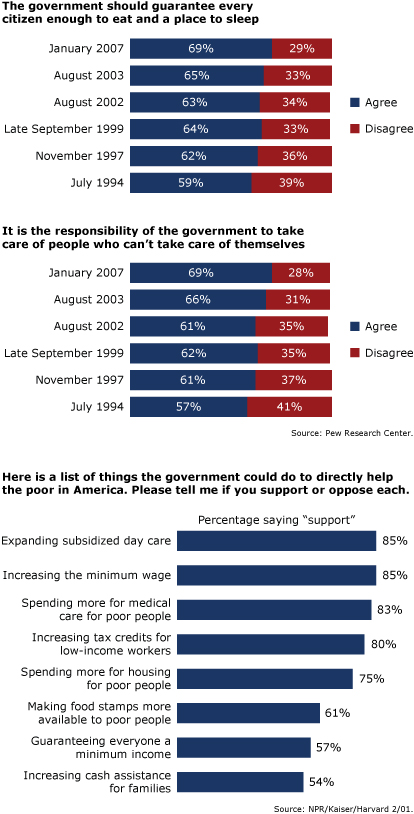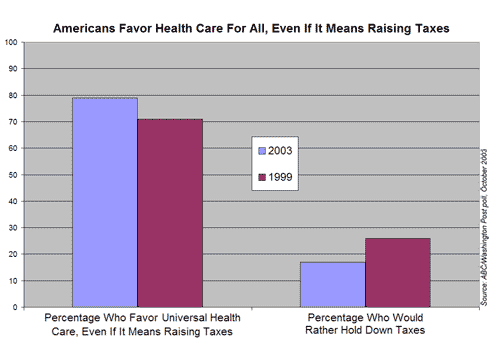From Ruy Teixeira, via Ezra:

Given that virtually no important politician in America would dare support a guaranteed basic income in public, it’s interesting that most Americans favor a guaranteed basic income of some sort.
And let me add this chart:

Although liberals are more in favor of universal health care than conservatives, there’s significant support for universal health care even among Republicans. According to the Pew Research Center, 50% of Republicans favor repealing most of the recent tax cuts in exchange for universal health care, and 60% of Republicans say they’d support a tax increase in exchange for universal health care. What’s frustrating is that in both parties, the leadership is less in favor of universal health care than the base.



I think the problem comes in when you move from generalities to specific policy proposals.
So why do we keep voting for these conservative disasters? (Who are disasters even on their own terms, I might add.)
What I wonder is if you put up the questions that conservatives would ask……would they support that in large numbers as well.
In other words, questions like “Keeping taxes low is important.” “People should take personal resonsibility for their well being.” “Poor people should work.” etc.
I think the numbers would be similar, indicating some contradictory values.
It is interesting that the values were more conservative during the Clinton era on those first two questions.
Perhaps George Bush has done more to turn people progressive than Clinton. Bush has screwed up so many things, he may have hurt the conservative cause for a long time.
Another liberal set of liberal issues gaining traction are environmental issues. With the cost of energy high again, conservation, renewable energy, and other environmental issues have made a big come back. Remember when they (successfully) made Al Gore look like he was looney. Now he’s looking really smart.
Rachel’s point about conservative value questions is valid.
Also, there’s a difference in what we say we support when we’re talking theory, versus when it comes time to write the check. “Sure, I’ll trade my tax cut for the theoretical health care plan you’ve outlined in three words.” But then you define the actual program, and calculate an actual bill, and interest goes away jes a little bit.
That said, these are depressing figures and I will spend the rest of the day re-reading “Capitalism and Freedom”.
Devil’s Advocate Mode: The government should spend more money helping private religious organizations do these things.
Lot’s of people claim to be for preserving wetlands. When presented with pictures of muddy and scrubby looking “vacant” areas, which are in fact functioning wetlands, they tend to quickly change their tune (it’s ugly, and also in my backyard). It’s a lot easier to be in favor of some nebulous ideal then the local plan that would in act said ideal.
Nice talk…but can you explain me how is that most of those “progressive americans” reelected a guy like George Bush 3 years ago?
Devil’s Advocate Mode: The government should spend more money helping private religious organizations do these things.
I can think of lots of arguments against this one, but I think I’ll start with the most “conservative” one: Why add another layer of bureaucracy to the process?
Don’t we have a bunch of cynical liberals on this thread. :)
The fact that we do keep electing conservative candidates (as did the French of all people!) calls into question the validity of this survey. Everybody wants everthing, until they have to pay for it. People talk about “the government” like it’s this magic body that can come up with resources out of thin air. But when it’s time to pay the tax bill, reality intrudes and people realize that “the government” is “me” – at least, if they are taxpayers.
Which reminds me of one proposition to get the American electorate to take a hard turn to the right; change election day to April 16th.
I can think of lots of arguments against this one, but I think I’ll start with the most “conservative” one: Why add another layer of bureaucracy to the process?
Good idea, Dianne. Here’s how we can solve this; cut the amount of social spending by the government in half and then give people tax credits (instead of tax deductions) for any donation to a charity that spends at least 90% of what it collects in the kind of social spending that was cut back. That would make the process more efficient and give the taxpayers a much more direct role in choosing what kind of social spending they put the most importance on.
cut the amount of social spending by the government in half and then give people tax credits (instead of tax deductions) for any donation to a charity that spends at least 90% of what it collects in the kind of social spending that was cut back.
Inefficient. How are a bunch of little charities supposed to know what people need on a national level? Besides which, then you’d have thousands of little bureaucracies each with its own set of conflicting rules, instead of one system. As someone who has dealt with both private health insurance forms and medicaid/medicare forms, I’d rather have one system any day. Even if it’s crazy, at least you can learn it and be done with it.
I’d rather start with cutting back rich person luxury subsidies. For example, why does the government need to be in the business of making life easier for car owners? If you want a road, build it yourself. Or pay tolls to those who do. And then there’s all the business subsidies. Why does the corn syrup industry need to be subsidized? Or the tobacco industry? Cut business welfare.
Why do charities need to know what’s needed on a national level? This is a federal republic – we are supposed to be doing things on a state or local level anyway. An organization that is set up to meet a specific need under specific local conditions can do so more efficiently than one huge organization that has to make their model fit both inner-city Chicago and rural Kansas as well as everything in between.
“Corporate welfare” is certainly a worthwhile target, though. There may be industries for which it’s in the national interest to prop them up, but I’ll bet the list is shorter than the actual list of those industries that get subsidies. Tobacco would head my list of exceptions.
Road building, OTOH, has been a government function from day one. Yes, I know there were private toll roads in the beginning of this country, but it has always been recognized that it is a legitimate government function (even among the most conservative people you would want to talk to) that building and maintaining roads is properly done by the government.
You seem to equate “rich person subsidy” with “car owners”. Do you think car owners are all rich? I propose to you that if every road was a private toll road, it would hurt poor people trying to get to work a lot more than rich people. I believe it would be the epitome of a regressive tax (or fee or whatever you want to call it). It would add costs to every good or service that is shipped from one location to another, as just about everything is carried in a truck at one point or another (few of us choose to live next to a train track), especially food. It would damage rural life quite a bit, since roads that don’t pay well to build or maintain due to low traffic would quickly degrade. It would also hurt the ability to respond to national defense needs (remember that the interstates were built to make it easier to move troops and their equipment from one point to another) and to respond to emergencies by evacuating people and moving in service workers and goods and materials.
Nice talk…but can you explain me how is that most of those “progressive americans” reelected a guy like George Bush 3 years ago?
Fear.
Elections, especially for President, turn on much more than agreement on issues (or even on understanding of the differences between the party’s ideologies) — personality of the candidates, use of spin, and on and on. I think this last one could be summarized by Cheney’s prediction that a Kerry victory would mean another 9/11. Visceral approaches trump logic again and again…
Fear? Just because Cheney made that prediction doesn’t mean people either listened to or believe it.
Maybe people vote for conservative politicians after saying they want more social services because people will say that they want something, but once it comes to actually voting for it people figure out that wish lists have to be paid for somehow. You know the old saying: “Everyone wants to go to heaven. Nobody wants to die.” Just because people say they want something doesn’t mean they want to do what it takes to get it.
Perhaps there are more people in this country than you think who are productive enough that adding more social services means that they will lose money on the deal and they then end up voting against providing them.